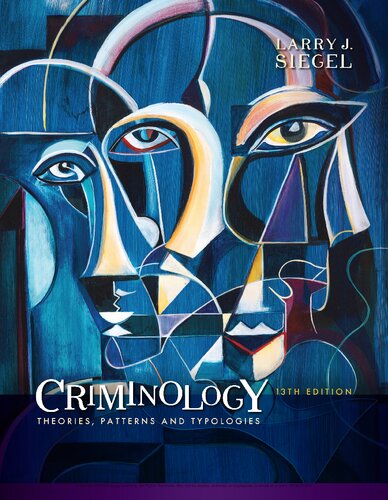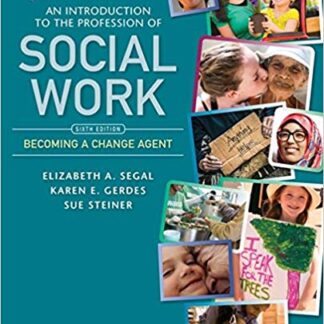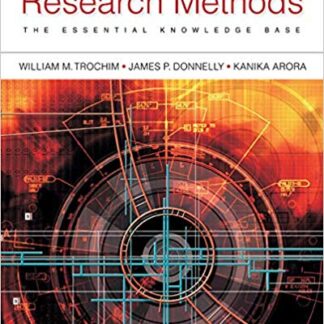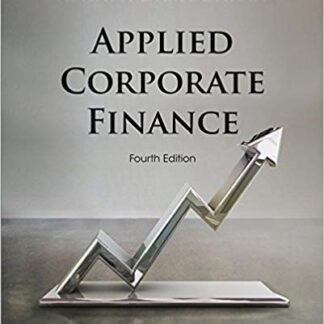Description
Criminology: Theories, Patterns and Typologies 13th Edition by Larry Siegel, ISBN-13: 978-1337091848
[PDF eBook eTextbook]
- Publisher: Cengage Learning; 13th edition (January 1, 2017)
- Language: English
- 640 pages
- ISBN-10: 1337091847
- ISBN-13: 978-1337091848
The bestselling text on the market and now in its thirteenth edition, CRIMINOLOGY: THEORIES, PATTERNS, AND TYPOLOGIES, delivers the most comprehensive, in-depth analysis of criminological theory and crime typologies available — showing you how criminology relates to criminal justice policy. Renowned for his unbiased presentation of theories, issues, and controversies, Dr. Siegel encourages you to weigh the evidence and form your own conclusions. The text includes cutting-edge seminal research, up-to-the-minute policy, hundreds of new references, and new material on the legalization of marijuana, ISIL and terrorism, mass shootings, cybercrime, green crime, and transnational crime. It also maximizes your study efforts through chapter objectives, end-of-chapter reviews, key concepts, concepts summary tables, and newsworthy examples that help you see how what you are learning applies in the real world, thereby equipping you with the tools you need to succeed.
Table of Contents:
Preface
Contents
Part One: Concepts Of Crime, Law, And Criminology
Chapter 1: Crime And Criminology
What Is Criminology?
Criminology And Criminal Justice
Criminology And Deviant Behavior
What Criminologists Do: Criminology In Action
Criminal Statistics And Crime Measurement
Socio-Legal Studies
Theory Construction And Testing
Criminal Behavior Systems And Crime Typologies
Punishment, Penology, And Social Control
Victimology: Victims And Victimization
How Criminologists View Crime
The Consensus View Of Crime
The Conflict View Of Crime
The Interactionist View Of Crime
Defining Crime
Crime And The Law
A Brief History Of The Law
Common Law
The Law In Contemporary Society
Shaping The Criminal Law
The Substantive Criminal Law
The Elements Of Criminal Law
Criminal Defenses
The Evolution Of Criminal Law
Ethical Issues In Criminology
Who To Study?
What To Study?
How To Study?
Chapter 2: The Nature And Extent Of Crime
Primary Sources Of Crime Data
Official Records: The Uniform Crime Report
Compiling The Uniform Crime Report
Are The Uniform Crime Reports Valid?
The National Incident-Based Reporting System (NIBRS)
Survey Research
The National Crime Victimization Survey (NCVS)
Self-Report Surveys
Evaluating The Primary Sources Of Crime Data
Secondary Sources Of Crime Data
Cohort Research
Experimental Research
Observational And Interview Research
Meta-Analysis And Systematic Review
Data Mining
Crime Mapping
Crime Trends
Official Crime Trends
Victimization Trends
Trends In Self-Reporting
International Crime Trends
What The Future Holds
Crime Patterns
The Ecology Of Crime
Use Of Firearms
Social Class, Socioeconomic Conditions, And Crime
Age And Crime
Co-offending And Crime
Gender And Crime
Race And Crime
Cultural Bias
Economic And Social Disparity
Immigration And Crime
Chronic Offenders/Criminal Careers
Chapter 3: Victims And Victimization
Problems Of Crime Victims
Economic Costs
Individual Costs
The Cycle Of Violence
The Nature Of Victimization
The Social Ecology Of Victimization
The Victim’s Household
Victim Characteristics
Victims And Their Criminals
Theories Of Victimization
Victim Precipitation Theory
Lifestyle Theory
Deviant Place Theory
Routine Activities Theory
Caring For The Victim
The Government’s Response To Victimization
Victim-Offender Reconciliation Programs
Community Organization
Victims And Self-Protection
Victims’ Rights
Part Two: Theories Of Crime Causation
Chapter 4: Rational Choice Theory
The Development Of Rational Choice
Development Of Classical Criminology
Cesare Beccaria
Classical Criminology
Contemporary Choice Theory Emerges
The Concepts Of Rational Choice
Why Crime?
Choosing Crime
Offense And Offender
Structuring Criminality
Structuring Crime
Is Crime Rational?
Is Theft Rational?
Is Drug Use Rational?
Is Violence Rational?
Eliminating Crime
Situational Crime Prevention
Targeting Specific Crimes
Situational Crime Prevention: Costs And Benefits
General Deterrence
The Perception Of Punishment And Deterrence
Certainty Of Punishment And Deterrence
Severity Of Punishment And Deterrence
Speed (Celerity) Of Punishment And Deterrence
Analyzing General Deterrence
Specific Deterrence
Can Punishment Produce More Crime?
Incapacitation
Does Incarceration Control Crime?
Public Policy Implications Of Choice Theory
Police And Deterrence
Courts, Sentencing, And Deterrence
Just Desert
Chapter 5: Trait Theories
Foundations Of Trait Theory
Biological Positivism
Cesare Lombroso
The Legacy Of Biological Criminology
Sociobiology
Contemporary Trait Theories
Biosocial Theory
Biochemical Conditions And Crime
Neurophysiological Conditions And Crime
Arousal Theory
Genetics And Crime
Evolutionary Theory
Evaluation Of The Biosocial Branch Of Trait Theory
Psychological Trait Theories
Psychodynamic Theory
Attachment Theory
Mental Disorders And Crime
Behavioral Theory
Cognitive Theory
Personality And Crime
The Antisocial Personality
Intelligence And Crime
Public Policy Implications Of Trait Theory
Chapter 6: Social Structure Theories
Development Of Sociological Criminology
Quetelet And Durkheim
The Chicago School And Beyond
Socioeconomic Structure And Crime
The Underclass
Child Poverty
Minority Group Poverty
Social Structure Theories
Social Disorganization Theory
The Social Ecology School
Collective Efficacy
Strain Theories
The Concept Of Anomie
Merton’s Theory Of Anomie
Institutional Anomie Theory (IAT)
Relative Deprivation Theory
General Strain Theory (GST)
Sources Of Strain
Coping With Strain
Evaluating GST
Cultural Deviance Theories
Conduct Norms
Focal Concerns
Theory Of Delinquent Subcultures
Theory Of Differential Opportunity
Evaluating Social Structure Theories
Public Policy Implications Of Social Structure Theory
Community Policing
Chapter 7: Social Process Theories: Socialization And Society
Socialization And Crime
Family Relations
Educational Experience
Peer Relations And Crime
Religion And Belief
Socialization And Crime
Social Learning Theory
Differential Association Theory
Differential Reinforcement Theory
Neutralization Theory
Are Learning Theories Valid?
Social Control Theory
Self-Concept And Crime
Hirschi’s Social Bond Theory
Social Reaction Theory
Defining Crime And Deviance
Labeling Effects And Consequences
Primary And Secondary Deviance
Research On Social Reaction Theory
Who Gets Labeled? Differential Enforcement
Is Labeling Theory Valid?
Evaluating Social Process Theories
Public Policy Implications Of Social Process Theory
Chapter 8: Social Conflict, Critical Criminology, And Restorative Justice
The Historical Development Of Critical Criminology
Productive Forces And Productive Relations
A Marxist Vision Of Crime
Creating A Critical Criminology
Contemporary Critical Criminology
How Critical Criminologists Define Crime
How Critical Criminologists View The Cause Of Crime
Failing Social Institutions
Globalization
State-Organized Crime
Instrumental Vs. Structural Theory
Instrumental Theory
Structural Theory
Research On Critical Criminology
Race And Justice
Critique Of Critical Criminology
Alternative Views Of Critical Theory
Left Realism
Critical Feminist Theory: Gendered Criminology
Power–Control Theory
Peacemaking Criminology
Critical Theory And Public Policy
The Concept Of Restorative Justice
Reintegrative Shaming
The Process Of Restoration
The Challenge Of Restorative Justice
Chapter 9: Developmental Theories: Life Course, Latent Trait, And Trajectory
Foundations Of Developmental Theory
Criminal Career Research
Life Course, Latent Traits, And Trajectories
Population Heterogeneity vs. State Dependence
Life Course Fundamentals
Disruption Promotes Criminality
Changing Life Influences
Life Course Concepts
Problem Behavior Syndrome
Offense Specialization/Generalization
Early Onset
Persistence And Desistance
Theories Of The Criminal Life Course
Sampson And Laub: Age-Graded Theory
The Marriage Factor
Age-Graded Theory Validity
Social Schematic Theory (SST)
Propensity/Latent Trait Theories
How Can The Aging-Out Process Be Explained?
Crime And Human Nature
General Theory Of Crime
Trajectory Theory
Early, Late, And Nonstarters
Chronic Offending
Pathways To Crime
Adolescent-Limited Offenders Vs. Life Course Persisters
Evaluating Developmental Theories
Public Policy Implications Of Developmental Theory
Part Three: Crime Typologies
Chapter 10: Interpersonal Violence
The Causes Of Violence
Psychological/Biological Abnormality
Human Instinct
Substance Abuse
Socialization And Upbringing
Exposure To Violence
Cultural Values: Subculture Of Violence
Cultural Values: National Values
Rape
History Of Rape
Rape And War
Incidence Of Rape
Types Of Rape And Rapists
The Causes Of Rape
Rape And The Law
Murder And Homicide
Degrees Of Murder
The Nature And Extent Of Murder
Murderous Relations
Multiple Murders
Serial Murder
Mass Murders
Spree Killers
Assault And Battery
Nature And Extent Of Assault
Assault In The Home
Dating Violence
Robbery
Types Of Robbers/Types Of Robberies
The Calculating Robber
Acquaintance Robbery
Emerging Forms Of Interpersonal Violence
Hate Crimes
Workplace Violence
Stalking
Chapter 11: Political Crime And Terrorism
Political Crime
The Nature Of Political Crimes
The Goals Of Political Criminals
Becoming A Political Criminal
Types Of Political Crimes
Election Fraud
Abuse Of Office/Public Corruption
Treason
Espionage
State Political Crime
Using Torture
Terrorism
Terrorist And Guerilla
Terrorist And Insurgent
Terrorist And Revolutionary
A Brief History Of Terrorism
Religious Roots
Political Roots
Contemporary Forms Of Terrorism
Revolutionary Terrorists
Political Terrorists
Nationalist Terrorism
Retributive Terrorism
State-Sponsored Terrorism
Lone-Actor Terrorists
How Are Terror Groups Organized?
What Motivates The Terrorist?
Psychological View
Alienation View
Socialization/Friendship View
Ideological View
Explaining State-Sponsored Terrorism
Extent Of The Terrorism Threat
Response To Terrorism
Confronting Terrorism With Law Enforcement
Combating Terrorism With The Courts
Confronting Terrorism With The Law
Combating Terrorism With Politics
Chapter 12: Property Crime
A Brief History Of Theft
Theft In The Nineteenth Century: Train Robbery And Safecracking
Contemporary Theft
Occasional Thieves
Professional Thieves
The Fence
Professional Cargo Thieves
Larceny/Theft
Larceny Today
Shoplifting
Bad Checks
Credit Card Theft
Auto Theft
False Pretenses/Fraud
Confidence Games
Embezzlement
Burglary
The Nature And Extent Of Burglary
Residential Burglaries
Commercial Burglary
Careers In Burglary
Arson
The Juvenile Fire Starter
Professional Arson
Chapter 13: Enterprise Crime: White-Collar, Green, And Transnational Organized Crime
The Concept Of Enterprise Crime
White-Collar Crime
Nature And Extent Of White-Collar Crime
White-Collar Swindlers
White-Collar Chiseling
White-Collar Exploitation
White-Collar Influence Peddling
White-Collar Embezzlement And Employee Fraud
Client Fraud
Corporate Crime
White-Collar Law Enforcement Systems
Controlling White-Collar Crime
Green Crime
Defining Green Crime
The Harms Perspective
Forms Of Green Crime
Controlling Green Crime
Organized And Transnational Organized Crime
Origins Of Organized Crime
The Mafia
The Rise Of Transnational Organized Crime
Characteristics Of Transnational Organized Crime
Activities Of Transnational Organized Crime
Transnational Gangs
Controlling Transnational Crime
The Causes Of Enterprise Crime
Rational Choice: Greed
Rational Choice: Need
Rationalization/Neutralization View
Cultural View
Self-Control View
Chapter 14: Public Order Crime: Sex And Substance Abuse
Law And Morality
Debating Morality
Social Harm
Moral Crusades And Crusaders
Moral Crusades Today
Sexually Related Offenses
Paraphilias
Pedophilia
Prostitution
Prostitution Today
Incidence Of Prostitution
Prostitution In Other Cultures
Types Of Prostitutes
Who Becomes A Prostitute?
Controlling Prostitution
Legalize Prostitution?
Obscenity And Pornography
Child Pornography
Does Pornography Cause Violence?
Pornography And The Law
Controlling Pornography
Substance Abuse
When Did Drug Use Begin?
Alcohol And Its Prohibition
How Much Drug Use Is There Today?
Alcohol Abuse
Costs Of Substance Abuse
What Causes Substance Abuse?
Is There A Drug Gateway?
Types Of Drug Users And Abusers
Drugs And Crime
Drugs And The Law
Drug Control Strategies
Drug Legalization
Chapter 15: Crimes Of The New Millennium: Cybercrime
Development Of Cybercrime
The Stages of Cybercrime
Contemporary Cybercrime
Cybertheft: Cybercrimes For Profit
Computer Fraud
Theft From ATMs
Ransomware: Extortion Via The Internet
Illegal Copyright Infringement
Internet Securities Fraud
Identity Theft
Etailing Fraud
Cyberdeviance: The Darker Side Of The Net
Distributing Pornography
Ehooking
Distributing Dangerous Drugs
Cybervandalism: Cybercrime With Malicious Intent
Data Breaches
Worms, Viruses, Trojan Horses, Logic Bombs, And Spam
Website Defacement
Cyberstalking
Denial-of-Service Attack
Cyberbullying
Cyberspying
The Costs Of Cybercrime
Combating Cybercrime
Cybercrime Enforcement Agencies
International Treaties
Cyberwar: Politically Motivated Cybercrime
Cyberespionage
Cyberattacks
Cyberterrorism
Combating Cyberwar
Glossary
Case Index
Name Index
Subject Index
Larry J. Siegel, Ph.D., was born in the Bronx, New York. While living on Jerome Avenue and attending City College (CCNY) in the 1960s, he was swept up in the social and political currents of the time. He became intrigued with the influence that contemporary culture had on individual behavior. For example, did people shape society or did society shape people? He applied his interest in social forces and human behavior to the study of crime and justice. After graduating from CCNY, he attended the newly opened program in criminal justice at the State University of New York at Albany, where he earned both master’s and doctoral degrees. Dr. Siegel began his teaching career at Northeastern University, where he was a faculty member for nine years. He has also held teaching positions at the University of Nebraska at Omaha and Saint Anselm College in New Hampshire. He then taught for 27 years at the School of Criminology and Justice Studies at the University of Massachusetts Lowell, where he is now a professor emeritus. Dr. Siegel has written extensively in the area of crime and justice, including books on juvenile law, delinquency, criminology, criminal justice, courts, corrections, criminal procedure and policing. Larry, his wife Therese and their dog Sophie now live in Naples, Florida, where he continues to write on various topics and issues in crime and justice.
What makes us different?
• Instant Download
• Always Competitive Pricing
• 100% Privacy
• FREE Sample Available
• 24-7 LIVE Customer Support





